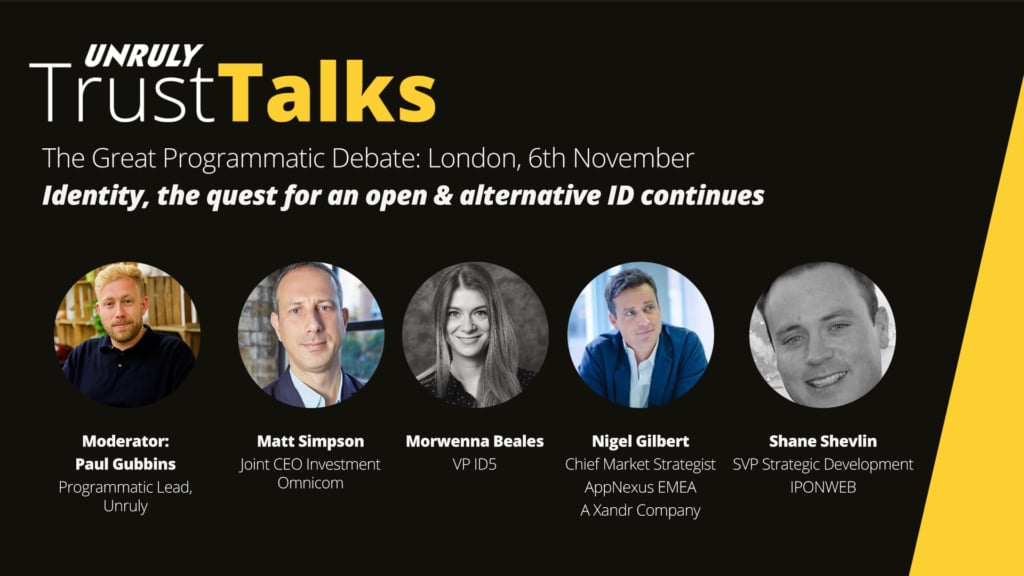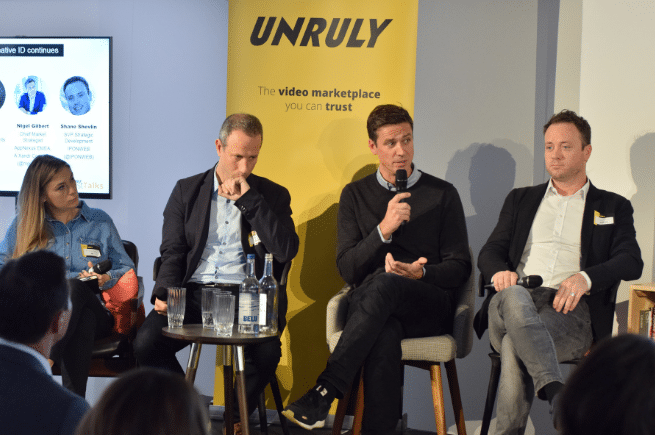Identity, the quest for an open and alternative digital ID continues
Our latest Trust Talks event took place on 6 November at the Hospital Club in London. The event was made up of four panels, all devoted to the wonderful world of programmatic! The event was a huge success and brought together influential figures from across the publishing and advertising industries for open and honest discussions about driving the industry forward.
Below you can read highlights from the panel hosted by Unruly’s Programmatic Lead, Paul Gubbins. The panel looked at where we are as an industry in the quest for an alternative and open digital ID, and discussed the idea that life post-cookie will challenge visibility for both buyers and sellers, unless they operate within walled gardens, ID portability, and how initiatives from bodies such as the IAB Tech Lab tackle areas of concern such as digital ID management, privacy legislation and the explosive growth of connected devices.
Paul was joined by Nigel Gilbert, Chief Market Strategist at AppNexus EMEA, A Xandr Company, Shane Shevlin, SVP Strategic Development at IPONWEB, Matt Simpson, Joint CEO Investment at Omnicom, and Morwenna Beales, VP at ID5.

Paul Gubbins (PG): Do you think that brands are aware of some of the challenges that they are potentially going to face in 12-24 months time?
Today the cookie predominately underpins advertising. However, environments that support the cookie are slowly going away. There’s less traffic on desktop devices and some mobile browsers are now restricting third party cookie tracking. If you’re a big brand or an agency, how do you manage things like holistic reach, frequency and attribution across a multitude of different vendors that may be using their own deterministic cross screen identifier? As a brand or an agency are you not going to become partially sighted?
Matt Simpson (MS): There’s no question that it’s getting more difficult and we have to come up with new solutions to get around it. The good news is that the majority of the industry, outside perhaps a couple of players, are all trying to get there.
Morwenna Beales (MB): Web traffic is obviously in decline however the cookie still represents the primary vehicle for monetisation. Over 60% is still based on the cookie and I think those that are in the digital ID space are well placed to look at solutions that go beyond it. However there’s definitely shortcomings right now that we’re focussing on to increase the commercial advantage within identity.

PG: Who should the custodians of the new digital ID be?
MS: I don’t think we need to see a single entity doing universal digital ID. There’s probably space for more than one to be doing it. We are after independence where it can be gained. The problem with everything that has happened so far is that there has always been more interested and influential parties that end up breaking down initiatives. Especially when people have less interest in those consortiums and start to feel that it’s not going their way. So I don’t know how it’s going to happen, but we will continue to show interest and back anyone who is trying to find a solution to the problem.
PG: Could the telecommunication companies (telcos) be the saviour to big brands and agencies, or are they just going to be another walled garden?
Nigel Gilbert (NG): I don’t think telcos would see themselves in that position, over the last few years one or two have had a run at them. Regulation is a real problem for telcos and a difficult hurdle to cross, particularly when you look outside of the UK where a lot of them are government owned businesses and they’re heavily regulated.
They don’t have the same wiggle room as the GAFA (Google, Apple, Facebook and Amazon) companies would have. Those companies have a lot more freedom in terms of what they can do, so I think that the telcos are hamstrung, they do have the best data, there’s no question about that. Not just identity but also behaviour. I don’t think enough time is being spent thinking about those things, and targeting the user is probably something that could get commoditised at some point in the future if a universal digital ID does actually come to the floor.
If everyone was using a universal digital ID it would cease to become some kind of differentiator. If you just had a universal digital ID, identity just becomes a commodity and nobody has any particular special access.

PG: Do you believe everyone needs independence or does that just create more fragmentation?
MB: I do think independence and neutrality is crucial because if you’re not neutral, you’re not getting adoption which is the biggest challenge we’re facing in the marketplace right now. We have gone down the VC funded route which I think is important too, as you need to have access to cash to be able to build this stuff.
Shane Shevlin (SS): If we think about the extension of the digital ID into the home (IoT, smart products etc), we need to be thinking ahead because the security of that identity becomes increasingly important. You will not have enterprise grade, best in class security technology solutions that are being built quickly enough to keep a pace.
You also have a separate issue of dominance of the GAFA in that environment which is a separate issue, but generally the protection of consumers identity in those environments is really important. The only way you can build safely against that is if you have an open accessible standard which is open source developed. The closest thing we’ve seen to date is the digitrust initiative. Whether it sits in the right place is another question.
PG: Do you think 2018 was a year where big CMOs stood up on stage and demanded supply chain transparency, and over the next two years do you think that they will be asking for digital ID portability?
NG: I don’t believe enough CMOs did demand transparency over the past two years, next year will be the big year for that. I think you’re a year too soon on all of these things. It really depends on the number of connected devices is everybody’s homes. I don’t know what everybody else has in their house, but I don’t have that many. I certainly don’t interact with them frequently like I would with my TV or my mobile.
MS: The interesting thing about the IoT is that they’ve changed the dynamics of identity. I’m married with three kids, and if you think about all the devices around the house they’re no longer individual. They are household level so what are you tying them to? We’re changing from individuals to households and we no longer understand who we’re targeting or who we’re speaking to. We’re banking on clients standing up and saying they are interested in data portability. From an Omnicom standpoint we believe in something called the agile ID which is building a client centric digital ID within their own environment because we think it’s the next thing that’s coming that is about portability.
If you’d like to watch the full panel in action, check out the video below
